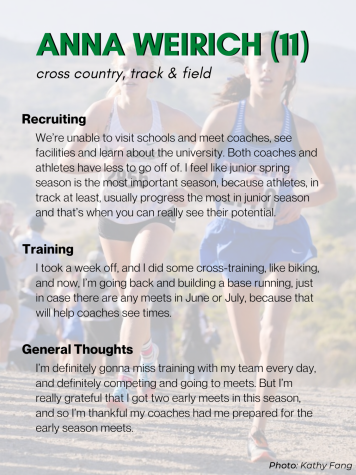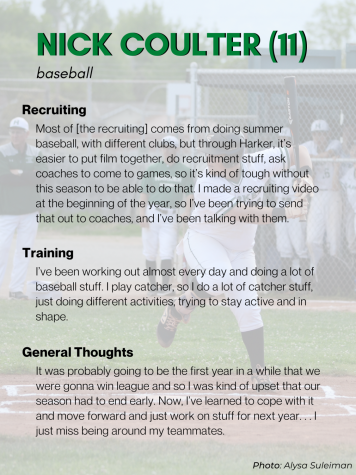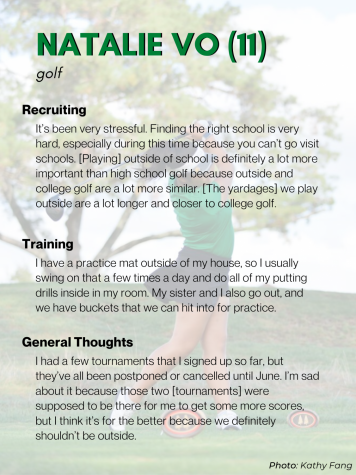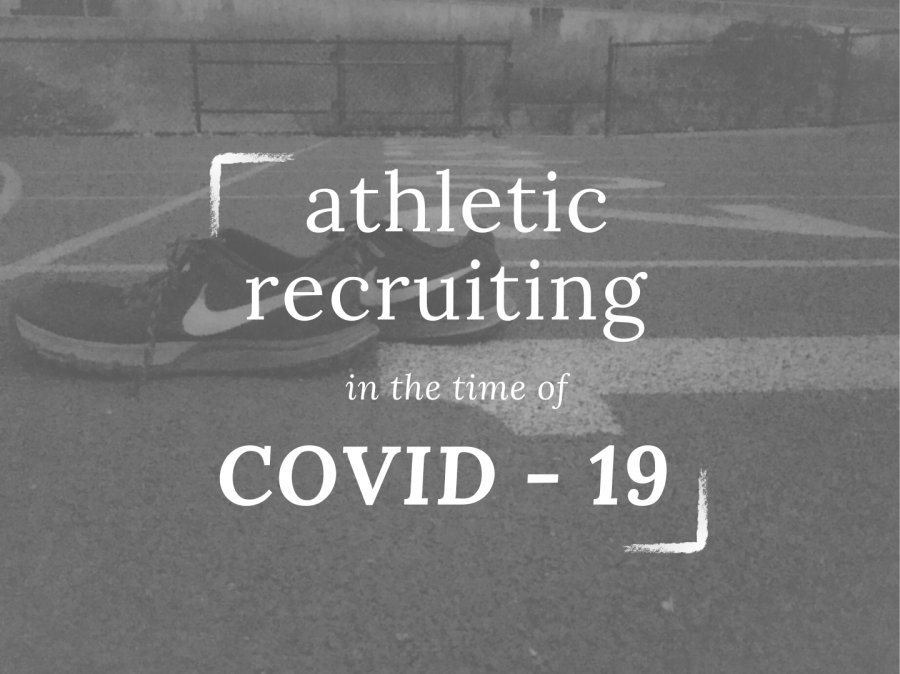Athletic recruiting in the time of COVID-19
A pair of long-distance running shoes lies on an empty track. The cancellation of interscholastic spring sports has drastically changed the recruiting scene for athletes looking to play in college — especially juniors.
May 4, 2020
While stuck at home during quarantine, Harker student-athletes have found creative ways to continue practicing their sports from home. For track and cross-country athlete Anna Weirich (11), this means supplementing her daily runs with biking as a form of cross-training. For junior baseball captain Nick Coulter, home training involves consistently working out in addition to performing baseball drills to polish his skills as a catcher. For golfer Natalie Vo (11), practicing during quarantine means doing putting drills in her bedroom and working on swings outside using empty buckets.
In a time where COVID-19 continues to spread, student-athletes need to find ways to stay in shape and in touch with their sports from home, as the California Interscholastic Federation (CIF) announced the cancellation of all spring sports in California as a part of worldwide efforts against the coronavirus earlier this month. This cancellation has also drastically changed the athletic recruiting scene, both for college coaches looking for new athletes for their programs and for aspiring athletes who wish to pursue their sports at the next level — especially juniors.
Lee Nelson, who is the head coach for the University of Nevada women’s volleyball team, described the impact the coronavirus has had on how his program approaches recruiting as “nothing [he] has ever seen before, in his career as a coach or player.” Typically, during this time of year, Nelson and his assistant coaches watch prospective recruits at their club volleyball tournaments and begin to schedule opportunities for those recruits to visit the university, see its facilities and meet the team and coaching staff.
“Now, we can’t do any [of those things] because everyone’s at home. So for the visit part, we’ve come up with a virtual visit, where we can meet with [the athletes] in an online setting, and then we’ll have some slides and video that we can show them, and so at least, we get to have a face-to-face meeting, even though it’s online, instead of phone calls,” Nelson said.

The cancellation of spring sports by the CIF has drastically affected the recruitment process, including for junior Anna Weirich, who runs both cross country and track.
The other big change in the recruiting process that Nelson’s program has been experiencing is that they can no longer watch any of their possible recruits play, which makes it extremely difficult to decide which athletes are a good fit for them.
“A big part of the recruiting process is evaluation, [finding out] who fits your needs, and we can’t do any of that. We got to do it a little bit in the beginning of the season in February, but since then everything has shut down,” Nelson said.
For athletes who wish to play at the college level that are struggling to find their way during this time, upper school Athletic Director Dan Molin recommends reaching out to college coaches.
“Communicate with the coach and say, ‘Hey, we’re all in the same boat here with the coronavirus and shelter in place and everything, and I just wanted to let you know that I’m still very interested in competing for your school once all of this is over,’” Molin said. “I would suggest direct communication and honesty, just reach out to those coaches and let them know you’re still out there.”
This type of communication between student-athletes and coaches, however, can only be carried out via phone or email, as the National Collegiate Athletic Association (NCAA) has banned in-person recruiting until May 31 as part of a recruiting “dead period” put in place as a response to COVID-19. This policy specifically has changed how the recruitment process works for a number of Harker athletes, including Anna.

Nick Coulter (11), who plays catcher, has been in contact with college coaches. “Communicate with the coach and say, “Hey, we’re all in the same boat here with the coronavirus and shelter-in-place and everything, and I just wanted to let you know that I’m still very interested in competing for your school once all of this is over,’” upper school Athletic Director Dan Molin said. “I would suggest direct communication and honesty, just reach out to those coaches and let them know you’re still out there.”
“We’re [now] unable to visit schools and meet coaches and see facilities and learn about the university. Both coaches and athletes have less to go off of,” Anna said. “I feel like junior spring season is the most important season, because athletes, in track at least, usually progress the most in junior season and that’s when you can really see their potential.”
Nick has faced similar challenges and pinpoints not being able to invite coaches to games as one of the hardest parts of the entire situation. As he continues to practice his various baseball skills at home during quarantine, Nick has stayed in contact with college coaches.
“I made a recruiting video at the beginning of the year, so I’ve been trying to send that out to coaches, and I’ve been talking with them, but it’s just not as effective as if we were playing in actual games,” he said.
For a number of sports, club seasons held outside of school play a larger role in the recruitment process than high school seasons do, as is the case with golf for Natalie. Although Natalie got to play her junior golf season in its entirety during the fall, many of the golf tournaments she had signed up to play in during the spring and summer have been postponed or canceled.
Natalie has not allowed this to discourage her, and like many other Harker athletes, she continues to work on polishing her craft at home.

For a number of sports, club seasons held outside of school play a larger role in the recruitment process than high school seasons do, as is the case with golf for junior Natalie Vo.
“I have a practice mat outside of my house, so I usually swing on that a few times a day and do all of my putting drills inside in my room. My sister and I also go out, and we have buckets that we can hit into for practice,” Natalie said.
Ultimately, in a time where the coronavirus pandemic has completely changed the face of athletic recruiting, the frustration that student athletes are experiencing hasn’t gone unnoticed, as coaches, like Nelson, are aware that players are faced with some especially important decisions at this time in their lives.
“A lot of the players who could potentially play Division 1 aren’t playing just for a hobby, they’re really invested in what they’re doing, they’re trying to be the best they can be. For a lot of them, this is the most important time for them to get recruited, so they’re missing that whole window,” Nelson said. “This is going to be one of the biggest decisions they make at this point in their life, [choosing] where to go to school, and for them not to be able to play, I think is really challenging.”


















![“[Building nerf blasters] became this outlet of creativity for me that hasn't been matched by anything else. The process [of] making a build complete to your desire is such a painstakingly difficult process, but I've had to learn from [the skills needed from] soldering to proper painting. There's so many different options for everything, if you think about it, it exists. The best part is [that] if it doesn't exist, you can build it yourself," Ishaan Parate said.](https://harkeraquila.com/wp-content/uploads/2022/08/DSC_8149-900x604.jpg)




![“When I came into high school, I was ready to be a follower. But DECA was a game changer for me. It helped me overcome my fear of public speaking, and it's played such a major role in who I've become today. To be able to successfully lead a chapter of 150 students, an officer team and be one of the upperclassmen I once really admired is something I'm [really] proud of,” Anvitha Tummala ('21) said.](https://harkeraquila.com/wp-content/uploads/2021/07/Screen-Shot-2021-07-25-at-9.50.05-AM-900x594.png)







![“I think getting up in the morning and having a sense of purpose [is exciting]. I think without a certain amount of drive, life is kind of obsolete and mundane, and I think having that every single day is what makes each day unique and kind of makes life exciting,” Neymika Jain (12) said.](https://harkeraquila.com/wp-content/uploads/2017/06/Screen-Shot-2017-06-03-at-4.54.16-PM.png)








![“My slogan is ‘slow feet, don’t eat, and I’m hungry.’ You need to run fast to get where you are–you aren't going to get those championships if you aren't fast,” Angel Cervantes (12) said. “I want to do well in school on my tests and in track and win championships for my team. I live by that, [and] I can do that anywhere: in the classroom or on the field.”](https://harkeraquila.com/wp-content/uploads/2018/06/DSC5146-900x601.jpg)
![“[Volleyball has] taught me how to fall correctly, and another thing it taught is that you don’t have to be the best at something to be good at it. If you just hit the ball in a smart way, then it still scores points and you’re good at it. You could be a background player and still make a much bigger impact on the team than you would think,” Anya Gert (’20) said.](https://harkeraquila.com/wp-content/uploads/2020/06/AnnaGert_JinTuan_HoHPhotoEdited-600x900.jpeg)

![“I'm not nearly there yet, but [my confidence has] definitely been getting better since I was pretty shy and timid coming into Harker my freshman year. I know that there's a lot of people that are really confident in what they do, and I really admire them. Everyone's so driven and that has really pushed me to kind of try to find my own place in high school and be more confident,” Alyssa Huang (’20) said.](https://harkeraquila.com/wp-content/uploads/2020/06/AlyssaHuang_EmilyChen_HoHPhoto-900x749.jpeg)




![The tennis courts at Westmont High in Los Gatos remain locked up. “It’s sort of hard to transition from playing tennis every single day to just not doing anything and sitting around,” varsity tennis co-captain Ramanand Vegesna (12) said. “Sometimes when you’re doing your own workouts it’s hard to stick to something and you kind of get lost in what you want to work on, so I think [Volt is] a really good tool, and people who don’t have a lot of experience working out can use it and figure out what exercise they want to do.”](https://harkeraquila.com/wp-content/uploads/2020/04/IMG_3499-300x225.jpg)
![An empty Davis Field, home to Eagles' athletics. “As long as school is in session and we feel everything’s in place, we’re business as usual until we’re told otherwise,” upper school athletic director Dan Molin said. “We’re anticipating [game cancellations], and we’ll cross that bridge when we get there with each individual game.”](https://harkeraquila.com/wp-content/uploads/2020/03/IMG_3680-300x200.jpg)









